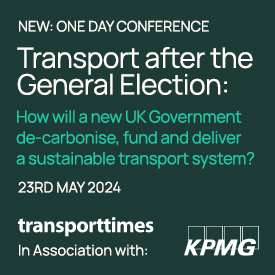The government has committed to spend an additional £3bn on buses over three years – Baroness Vere says it’s too early to say what happens after that

The government is not ready to commit to additional funding for local bus services in England beyond its existing commitment to invest £3bn over three years. Addressing a Transport Focus online board meeting last week, transport minister Baroness Vere instead expressed hopes that new bus lanes will enable services to become self-sustaining.
Transport Focus board member Theo de Pencier pointed out that the strategic road network has a regular five-year planning and funding cycle. “This seems to work well,” he observed, “and obviously there has been a very welcome injection of funds into bus. But is there also going to be a regular mechanism to keep this going? Will we have, for example, for bus a five-year planning and funding cycle as well anytime soon?”
Vere responded: “Bus is not the same as the strategic road network or the rail network but it is the case and we have made the commitment that there is a £3bn pot of funding which is available over the course of this parliament.
Can I say what is going to happen after that £3bn over the course of this parliament? I can’t. I think it’s a bit early to say
“Can I say what is going to happen after that £3bn over the course of this parliament? I can’t. I think it’s a bit early to say because one of the ambitions that we have for bus … particularly on the high frequency, very popular routes, [is that] if we can make them much better bus corridors by adding the sorts of priority measures that we want to it could be that, within a network, within an area, it becomes self-sustaining.”
Vere pointed out that the bus sector in England already receives £1bn a year for concessionary travel in addition to the Bus Service Operators Grant (BSOG) and the emergency Covid-19 Bus Services Support Grant (CBSSG).
She continued: “What I don’t want to say is ‘yes there will be another pot of £3bn after that’ because we don’t really know what’s going to happen over the next few years.
“What I do hope will happen, and obviously it will depend on what happens in the spending review, is that we have much greater visibility over a few years. Because obviously we’ve just done a one-year spending review. It would be great if we could have greater visibility over a few years to give greater certainty to local authorities.”
Addressing the same meeting, Pete Bond, director of integrated services at Transport for the West Midlands, said that significant additional funding would be required to achieve the aspirations of the government’s National Bus Strategy for England. Bond identified two major risks.
The first was any reduction of funding ahead of the launch of Bus Service Improvement Plans (BSIPs) in April 2022 – a key requirement of the bus strategy.
“[That] could pose a real risk, for not only the networks as they currently exist but also how we intend to build and green and develop those further to get more people back on them,” he warned.
“So, I think we really need to be sure on that funding commitment that is available to support the bus strategy that gets us to that period in April where local transport authorities and [bus] operators want to commence and need to commence BSIPs under the strategy.”
Our initial assessment for our region says that to deliver all of the pledges within the national bus strategy would likely cost us around £1bn in the West Midlands
The second risk identified by Bond relates to the cost of delivering the strategy. “The intent is amazing … and the objectives cost money,” he said. “And the strategy has been linked to £3bn of funding. Our initial assessment for our region says that to deliver all of the pledges within the national bus strategy would likely cost us around £1bn in the West Midlands.
“And if we represent as we do 10% of bus services in England outside of London, I would suggest if it was the same in other areas we’re probably looking at a cost more likely of £10bn to deliver all of the outcomes of the national bus strategy – to support the priority [measures for buses], the greening of the fleet, the increased frequencies, better serving the 24/7 economy, reduced fares, multi-operator and multi-modal fares, better innovation and the likes.
“The additional £3bn] lasts until the end of this parliament and we really need to be thinking about what happens after that.
“Will all of these services have really become self-funding? Will government have set up a fund to green the remaining 70% of the national bus fleet? And will local transport authorities have been truly empowered to deliver that devolved approach as we need or will we be bidding pot by pot competitions?”
Bond warned that bus operators and local transport authorities “can’t just magic out of 35 years of disconnect and challenges – relationships take time to build”. He also warned the government not to underestimate the challenges of mixing covid recovery with stretching targets.
Concluding his remarks, he said: “Please please please don’t throw the opportunity under the bus, literally, with funding cuts before we get it going. That would set us all back years and put the strategy itself in danger of falling onto a shelf.”
This article appears alongside further coverage in the latest issue of Passenger Transport.
DON’T MISS OUT – GET YOUR COPY! – click here to subscribe!







